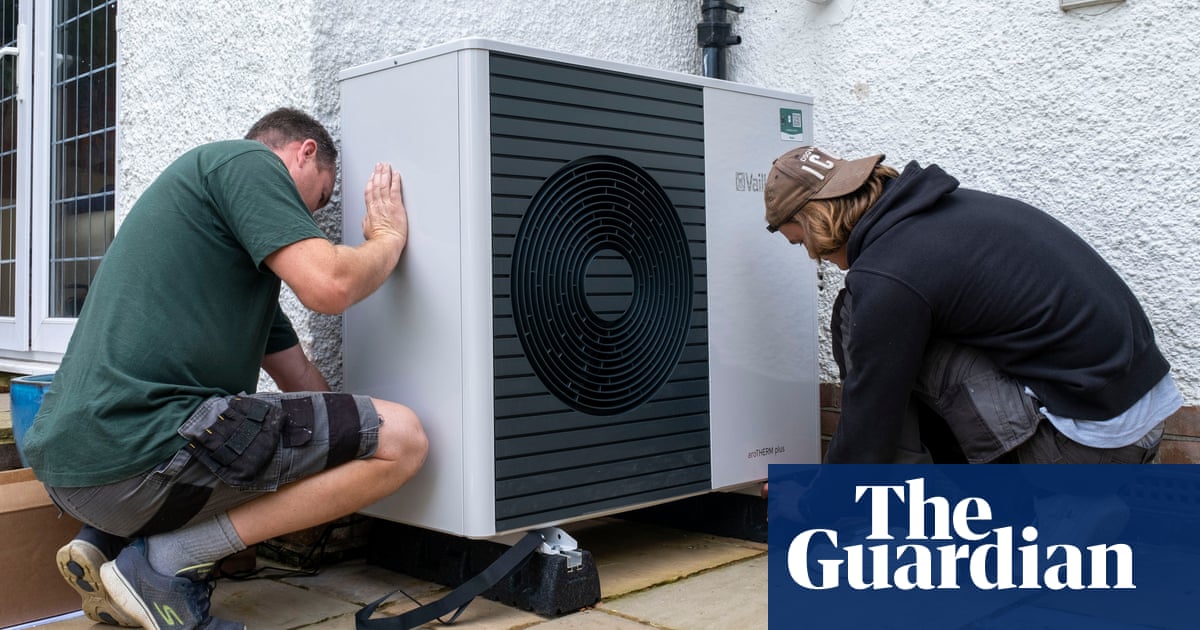
Building new homes to low-carbon standards would save the occupants thousands of pounds, new research has shown, as experts urged the government to change the regulations on housing development.
People living in a typical three-bedroom, semi-detached newly built house would save an average of £1,341 a year if it was equipped with solar panels, a heat pump, high-grade insulation and battery storage.
That would equate to about £46,612 over a 25-year mortgage term, according to modelling seen by the Guardian, carried out by the MCS Foundation charity.
Millions of homes without this equipment have been built in recent years, and hundreds of thousands more are in the pipeline.
Labour has made building 1.5m homes the centrepiece of its plans for economic growth and national renewal. But it is still unclear whether these homes will be built to the highest possible standards of insulation and low-carbon technology.
The government is currently considering how to respond to a consultation on a Future Homes Standard completed under the last govt, though experts hope it could come into force next year. While the government has indicated it could require developers to incorporate solar panels into new homes – a measure rejected by the previous Tory government – as well as heat pumps, or low-carbon networks, one question still left open is whether to mandate battery storage.
The MCS research shows that the greatest energy bill savings and reductions in carbon emissions are achieved when solar panels and battery storage are combined with heat pumps, resulting in energy bills nearly three times lower than only installing a heat pump.
According to the modelling, energy bills for an average three-bed, semi-detached home with a heat pump would be £1,764 a year, compared with £603 if solar panels were also installed, meaning £1,161 in annual savings. With battery storage, the savings rise to £1,342.
David Cowdrey, the acting chief executive of the MCS Foundation, said: “Installing the full range of solar panels, heat pumps, and battery storage in new homes at the point of construction will lock in low bills and low carbon emissions. Crucially, missing out any one of these technologies will result in unnecessarily higher energy bills.”
The number of panels mandated is also important. Nigel Ward, the operations manager at Gusto Construction, based in Nottinghamshire, said some developers were installing too few panels for the size of a house, and failing to ensure they were correctly oriented to maximise sunlight.
He said: “It’s not difficult to build a house to low-carbon standards – this is new technology but it’s not brand new – but it does require a little bit of care and attention.”
Ward told the Guardian it was “purely thinking about profits” that led big housing developers to continue to build houses to minimum standards, with gas boilers and without low-carbon equipment.
Experts have also told the Guardian of their fears that the Labour government will cave into pressure from housing developers to water down the future homes requirements, if the developers plead that they can build more quickly and cheaply without such high standards.
Cowdrey said: “With many people once again facing the worry of rising energy bills this winter, the government has an opportunity to ensure that new homes are insulated from future energy price shocks. We should not be building homes in 2025 that need to be retrofitted, at much greater cost, in 10 years’ time and so a forward-looking future homes standard should be implemented in full and without delay.”
Developers can build more cheaply if they do not need to incorporate high-grade insulation and meet stringent regulations on airtightness, and if they can build with gas boilers instead of heat pumps. Equipping homes with low-carbon technology is estimated by the government to add about £5,000 to the cost of construction. It would be up to the developers whether or not to pass those costs on to the housebuyer.
Anger has grown over recent years at the previous government’s failure to rein in the housing sector, which was a major donor to the Conservative party. Lord Deben, the former Tory environment minister and former chair of the Climate Change Committee, recently lambasted the “crap” homes the UK has been building for years, since plans for higher standards were shelved in 2015.
Gemma Grimes, the director of policy and delivery at Solar Energy UK, a trade association, said: “Requiring new-build homes to have solar, heat pumps and battery storage would be a welcome triple whammy in the fight against high energy bills. Doing so would also improve national energy security and boost economic growth. The MCS Foundation is right to demand that the new Labour government urgently reconsiders excluding batteries from the future homes standard.”
A Ministry of Housing, Communities and Local Government spokesperson said: “We have committed to ensuring new homes are well-designed and sustainable, and recognise the importance of low carbon technologies such as solar panels and heat pumps in achieving this.”












